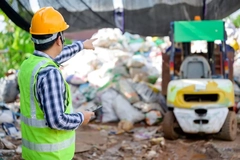Biden administration unveils national strategy to strengthen efforts to reduce plastic waste

The US Environmental Protection Agency (EPA) has unveiled its “National Strategy to Prevent Plastic Pollution,” a comprehensive blueprint outlining actionable steps for government agencies, businesses, nonprofits and communities to reduce plastic pollution.
The strategy, forming the third pillar of EPA’s “Building a Circular Economy for All” policy, builds upon previous national efforts to improve recycling and reduce food loss and waste. The US aims to eliminate the release of plastic waste into the environment by 2040.
EPA Administrator Michael S. Regan says: “EPA’s new strategy to prevent plastic pollution will have a profound impact on public health and our environment, especially in overburdened communities hit hardest.”
“From reducing cancer-causing pollution from plastic manufacturing facilities, to increasing industry’s accountability to take back recycled plastic packaging, to capturing waste before it ends up in our bodies and the environment, this strategy lays out the path forward for EPA and our partners to tackle this persistent challenge.”
Actions to combat pollution
Example actions from the strategy include reducing the production and consumption of single-use plastic products and increasing the US capacity to reuse and refill products, including within the federal government. The strategy also involves measuring the environmental and human health impacts throughout the lifecycle of single-use products.
Additionally, it emphasizes enhancing public policies and incentives to decrease plastic pollution, such as collaborating with stakeholders to create a national extended producer responsibility framework.
Ed Gainey, Pittsburgh mayor, expressed the city’s support for the EPA’s efforts to eliminate plastic waste, reaffirming its leadinging role in the US.
“We are proud of our plastic bag ban that unanimously passed in 2022. So many of these bags were used just once, rarely recycled properly, littered our streets, sidewalks and rivers and negatively impacted the health of our residents.”
 The negotiations hope to conclude with a meaningful outcome at the end of INC-5 (Image credit: IISD Earth Negotiations Bulletin).“We are encouraged by the EPA’s efforts to eliminate plastic waste. We look forward to continuing to find new and innovative strategies to ensure that Pittsburgh is clean and pollution-free for generations to come.”
The negotiations hope to conclude with a meaningful outcome at the end of INC-5 (Image credit: IISD Earth Negotiations Bulletin).“We are encouraged by the EPA’s efforts to eliminate plastic waste. We look forward to continuing to find new and innovative strategies to ensure that Pittsburgh is clean and pollution-free for generations to come.”
Global negotiations amid political uncertainty
EPA released the national strategy ahead of the fifth session of the International Negotiating Committee on Plastic Pollution (INC-5), held in Busan, South Korea. The strategy is expected to inform international negotiations, highlighting the wide range of actions already being taken domestically and offering a model for other nations.
The blueprint aligns with the US’ international commitments to combat plastic pollution on a global scale. This August, the Biden administration signaled an intent to support plastic production caps and chemical bans in the upcoming final meeting for the UN Global Plastic Treaty.
However, in light of the recent US elections, Donald Trump’s return to the presidency has introduced uncertainty regarding the country’s stance on participating in global efforts to address plastic pollution.
During his campaign, president-elect Trump expressed his intent to withdraw from the Paris climate agreement and is expected to expand oil and gas extraction.
Earlier this year, a survey conducted by the Center for Climate Integrity and Data for Progress demonstrated bipartisan support for holding the plastics and fossil fuel industries accountable for environmental harm. The findings underscore increasing concern about the impacts of plastic waste, which resonate across political, racial and demographic groups.










